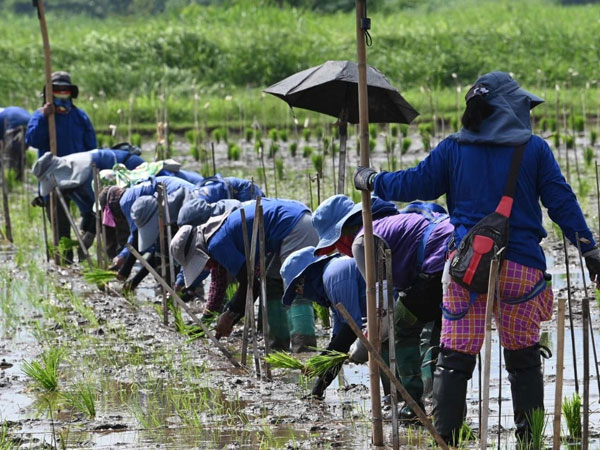 The suspension period will cover the country’s peak harvest season, when domestic supplies are adequate
The suspension period will cover the country’s peak harvest season, when domestic supplies are adequate
The Philippines, among the world’s largest buyers of rice, will suspend imports of the grain for 60 days from September 1 to protect local farmers affected by falling prices during the harvest season, the government said on Wednesday.
President Ferdinand Marcos Jnr ordered the suspension, Communications Secretary Dave Gomez told reporters, adding that tariff increases on imported rice had been ruled out for now. “We will still see if we need to resort to that,” Gomez said.
Agriculture Assistant Secretary Arnel de Mesa said the suspension period covered the country’s peak harvest season, when domestic supplies were adequate.
Output of paddy rice, usually planted twice a year, reached 8.2 million tonnes (9 million tons) in the first half of the year. The government is targeting to produce a record 18.5 million tonnes (20.5 million tons) for the full year.
Last year, the government cut the import duty on rice to 15 per cent from 35 per cent until 2028 in a bid to tame inflation. Rice prices in the Philippines dropped by a record 15.9 per cent last month.
The announcement comes after Agriculture Secretary Francisco Tiu Laurel Jnr pushed for a temporary halt in imports of the national staple as well as an increase in rice import tariffs. He has said an influx of imported rice was hurting local producers and could force millers to shut operations.
The Philippines imported 4.8 million tonnes (5.3 million tons) of rice last year, with Southeast Asian neighbours Vietnam and Thailand among its key suppliers. It was not immediately clear whether any pending orders would be affected by the suspension.
Marcos’ move came as data showed agricultural and fisheries output grew by 5.7 per cent in the second quarter from a year earlier to 437.53 billion pesos (US$7.6 billion), marking the fastest expansion in eight years.
Crop output, which accounted for 56 per cent of total farm production, climbed 11.3 per cent from a year earlier. Rice production grew an annual 13.9 per cent, a sharp acceleration from the 0.3 per cent growth in the first quarter.
Falling rice prices helped slow annual inflation to a near six-year low of 0.9 per cent in July, after the government had declared a “food security emergency” earlier this year to bring down the cost of the national staple.
Economic growth data on Thursday is forecast to show the economy grew by an annual 5.4 per cent in the second quarter, matching the previous quarter’s growth rate, according to a Reuters poll.














© Copyright 2025 The SSResource Media.
All rights reserved.